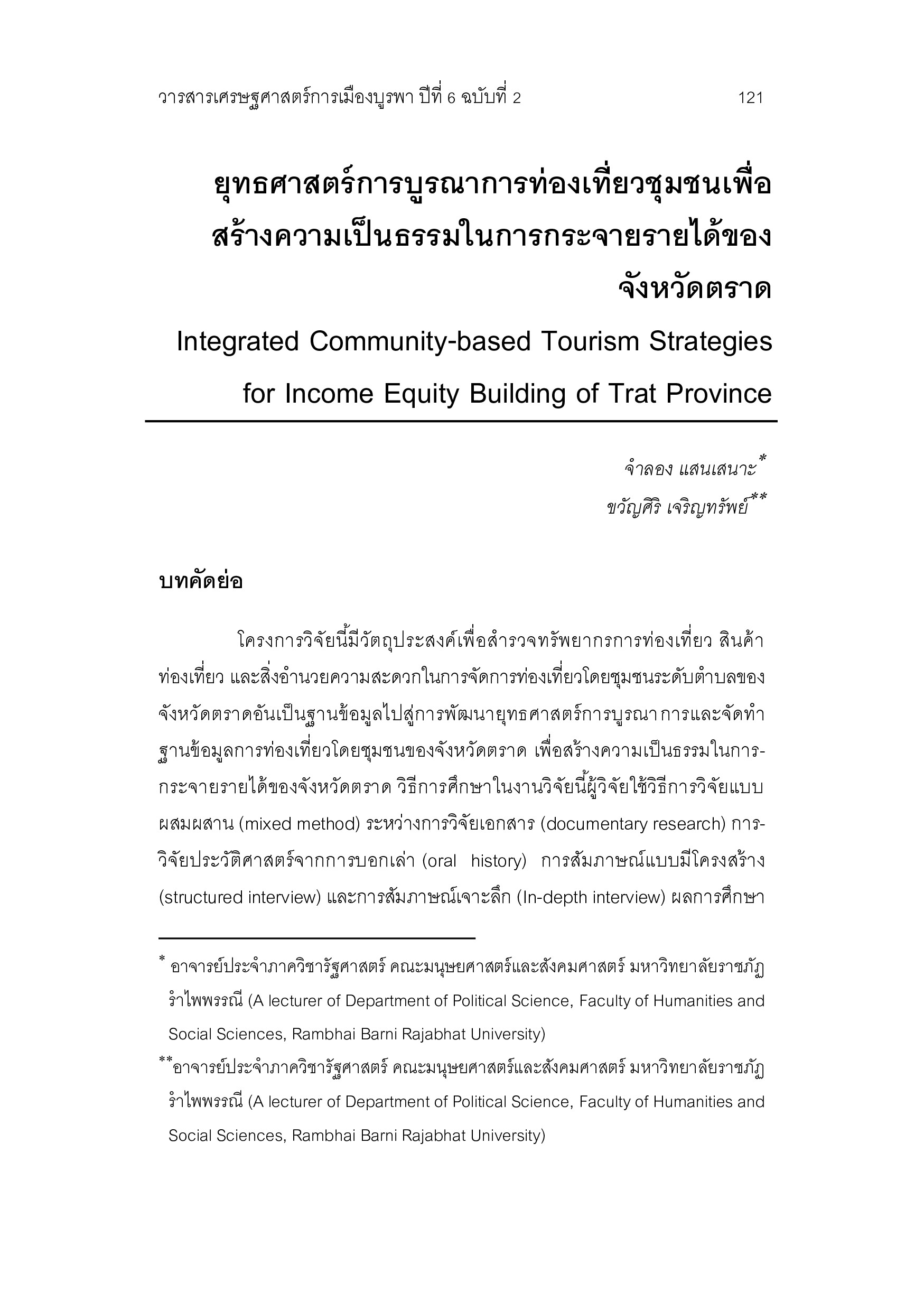Integrated Community-based Tourism Strategies for Income Equity Building of Trat Province
Keywords:
Integrated Strategies, Community-Based Tourism, Equity BuildingAbstract
The objective of this research was to investigate tourism resources, tourism products, and tourism facilities operated by the sub-district communities in Trat province which brought about to the integrated strategy development and tourism database operation made by the community in Trat province for income equity building in Trat province. The mixed method research methodology consisting of documentary research, oral history, structured interview, and in-depth interview were applied to this study. The findings showed that the income equity building in Trat province driven by the community tourism management should be integrated with ecotourism, culture, beaches, history, and culinary tourism. The study of strengths, weaknesses, opportunities, and threats revealed that the strategic status of community tourism in Trat province was the approach strategies, showing the community tourism in Trat province had to necessarily be driven and developed by emphasizing on the strengths of Trat province in order to establish more propitious chances. Therefore, the content of strategies for driving the community tourism in Trat province should be focused on the development of tourist attractions made by the community in Trat province with the connection of Trat province and Cambodia. The strategies to strengthen SMEs should be done in order to develop the potential of tourism conducted by the community.
References
เอกสารภาษาไทย
การท่องเที่ยวแห่งประเทศไทย. (ม.ป.ป.). 12 เมืองต้องห้ามพลาด. ม.ป.ท.
คณะกรรมการฝ่ายประมวลเอกสารและจดหมายเหตุในคณะกรรมการอำนวยการจัดงานเฉลิมพระเกียรติพระบาทสมเด็จพระเข้าอยู่หัว. (2542). วัฒนธรรม พัฒนาการทางประวัติศาสตร์ เอกลักษณ์และภูมิปัญญา จังหวัดตราด. กรุงเทพฯ: คุรุสภาลาดพร้าว.
ชัยยนต์ ประดิษฐศิลป์. (2553). การให้คำปรึกษา เรื่องการพัฒนายุทธศาสตร์และการบริหารจัดการที่ดี เพื่อสนับสนุนการพัฒนาขีดความสามารถแกนนำของขบวนองค์กรชุมชนระดับจังหวัด กรณีจังหวัดตราด. กรุงเทพฯ: สถาบันพัฒนาองค์กรชุมชน.
_______. (2559). ตำราปฏิบัติการวิจัยทางสังคม. จันทบุรี: มหาวิทยาลัยราชภัฏรำไพพรรณี.
ไพฑูรย์ มีกุศล. (2557). ทรัพยากรการท่องเที่ยวทางประวัติศาสตร์ โบราณสถานและศาสนสถาน. นนทบุรี: มหาวิทยาลัยสุโขทัยธรรมาธิราช.
ราณี อิสิชัยกุล. (2557). การจัดการท่องเที่ยวเฉพาะทาง. นนทบุรี: มหาวิทยาลัย สุโขทัยธรรมาธิราช.
วิไลลักษณ์ เสรีตระกูล และคณะ. (2550). การประมาณรายได้จากกิจกรรมการท่องเที่ยวทางธรรมชาติอย่างยั่งยืน บนพื้นที่เกาะช้าง กิ่งอำเภอเกาะช้าง จังหวัดตราด. กรุงเทพฯ: สำนักงานกองทุนสนับสนุนการวิจัย.
สมชาย เดชะพรหมพันธุ์. (2546). ชุมชนเกาะช้าง. ชลบุรี: คณะมนุษยศาสตร์และสังคมศาสตร์ มหาวิทยาลัยบูรพา.
สิตางศ์ เจริญวงศ์. (2554). การก่อรูปองค์กรของภาคประชาชนในจังหวัดตราด. ชลบุรี: คณะมนุษยศาสตร์และสังคมศาสตร์ มหาวิทยาลัยบูรพา.
สุภางค์ จันทวานิช. (2535). การวิเคราะห์ข้อมูลในการวิจัยเชิงคุณภาพ. กรุงเทพฯ: คณะรัฐศาสตร์ จุฬาลงมหาวิทยาลัย.
สุวัฒน์ จุธากรณ์. (2557). แนวคิดเกี่ยวกับการท่องเที่ยว. เชียงใหม่: มหาวิทยาลัย เชียงใหม่.
สฤณี อาชวานันทกุล. (2554). ความยุติธรรม. กรุงเทพฯ: openworlds.
เอกสารภาษาต่างประเทศ
Charles, T. & Abbas, T. (2009). Foundations of Mixed Methods Research: Integrating Quantitative and Qualitative Approaches in the Social and Behavioral Sciences. London: SAGE.
ข้อมูลจากการสัมภาษณ์
สมโภชน์ วาสุกรี. (2559, 21 ตุลาคม). ปราชญ์ชาวบ้านจังหวัดตราด. สัมภาษณ์.
_______. (2559, 29 ธันวาคม). ปราชญ์ชาวบ้านจังหวัดตราด. สัมภาษณ์.






